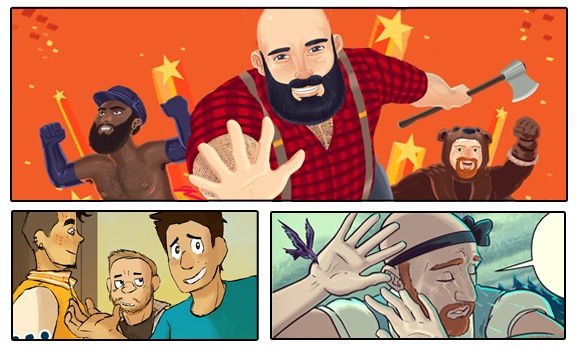Looking through the comic panels of the soon-to-be-releasedВ Rainbow Reflections: Body Image Comics for Queer Men, itвҖҷs clear that this project was meant to start conversations вҖ” and thatвҖҷs just what Phillip Joy hoped for.
 Phillip is a third-year PhD in Health student in the В鶹ҙ«ГҪ Faculty of Health researchingВ how culture shapes eating practices and body images of queer men (which he identifies as). His PhD supervisor is Matthew Numer in the School of Health and Human Performance.
Phillip is a third-year PhD in Health student in the В鶹ҙ«ГҪ Faculty of Health researchingВ how culture shapes eating practices and body images of queer men (which he identifies as). His PhD supervisor is Matthew Numer in the School of Health and Human Performance.
Making research accessible
Phillip was awarded a Hacking the Knowledge Gap grant through the Canadian Institutes of Health Research (CIHR)В . He was teamed up with fellow В鶹ҙ«ГҪ student Matthew Lee in the Faculty of Medicine, and Stephanie Gauvin from Queen's University. Each received $25,000 to pool together to improve knowledge translation for LGBTQ+ communities by presenting research in an accessible way for health professionals.
Phillip says it was important for the team to do something innovative and artistic, which is why they chose to create a comic book.
вҖңMy philosophy was if IвҖҷm going to work on something for a year, I want it to be cool and different, something to get the blood flowing.вҖқ
Phillip says comics capture peopleвҖҷs imagination and attention and are a great way to showcase different experiences. вҖңReally, only academics want to read other academic papers. This is much more accessible to the community.вҖқ
They chose to explore how to improve the emotional, mental, and sexual health of queer men by talking about body image вҖ” specifically in relation to weight and muscularity.
Artists... assemble!
The team put out a call for queer artists across the world, and there was a great response. The comic features 40 international artists from seven different countries: Australia, Denmark, Greece, Germany, England, United States, Canada, and local Halifax artists.
Phillip acknowledged that in addition to first-hand stories from the illustrators, they also needed to present the research, so they hired several Canadian artists to create one-page inserts with information from peer-reviewed literature. Although Phillip didnвҖҷt contribute illustrations or personal stories himself, there is an illustrated synopsis of his dissertation in the back because it draws from some of the same studies.

PhD student Philip Joy. (Danny Abriel photo)
This project is personal to him because he can relate to a lot of what he sees on the pages.
вҖңThere are stories about the pressure to live up to cultural expectations of male bodies, and other things that seem to be a universal experience for gay men.
вҖңI learned things too. IвҖҷm not a trans man so there were issues that I wasnвҖҷt even aware of, which several artists brought forth in their comics. There are unique concerns about typical images of masculinity, so that was really powerful for me.вҖқ
It was also impactful for Phillip to be able to support queer artists and give them a voice.
Bringing awareness
Phillip says he hopes this comic will get into the hands of the LGBTQ+ community, and the people who work to improve the health of those communities, because they need to know what issues are out there.
вҖңWhen talking about queer health, there are some topics that get more attention than body image concerns. This is a way to bring more attention to these issues.вҖқ
вҖңThereвҖҷs a feeling of commonality, that you donвҖҷt have to struggle with these feelings alone.вҖқ
The team will be buying a few hundred copies once it is printed to send to LGBTQ+ health centres. They plan to have it printed in July withВ , a Canadian social-justice comic publisher. The publisher and some of the local artists featured in the comic will be attending the Dartmouth Comics Arts Festival.
The comic book will be launched to the public with an event on Friday, September 13 from 1:00 вҖ“ 3:00 pm at the Halifax Central Library.

